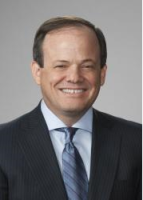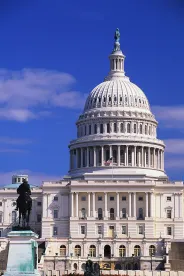The effort to grow the U.S. economy has led to predictable stalemates on trade policy and international commerce over the past couple of years. As a result of disputes involving environmental, labor, and competiveness concerns, most free trade initiatives stalled in Congress or during international negotiations over the past two years. However, the 2012 elections made trade issues more visible. Both President Obama and Governor Romney promised to use international trade as a means to reinvigorate the U.S. economy, and promised to more harshly punish trading partners that they accuse of being "cheaters."
While it is not possible to predict specific outcomes on trade policy, the reelection of President Obama and a new Congress that looks nearly identical to the last Congress in terms of partisan makeup brings both risks and opportunities in the areas of international trade and commerce.
In general, those interested in trade policy and international commerce can expect that the following issues will be hotly debated in Washington during 2013:
- Foreign Investment Issues - Foreign investment in the U.S. economy in the form of acquisitions, partnerships, and passive investment is increasingly important. However, foreign investment also has a history of serving as a political flashpoint, especially when the investment comes from countries that politicians benefit from criticizing. For example, investment from China has been subjected to a growing amount of scrutiny by the Committee on Foreign Investment in the United States (CFIUS), and Members of Congress have been increasingly willing to identify such investment as a threat to U.S. national security. Over the next year, these types of controversies are likely to grow in number and frequency as U.S. and Chinese entities endeavor to find ways to partner with each other in a complicated political environment. These controversies will require careful maneuvering of the legal, communications, and political aspects of foreign investment in order to avoid having transactions derailed and the overall trade relationship imperiled. And while the reelection of President Obama makes it less likely that action will be taken on issues such as alleged currency manipulation, the Obama Administration has promised to strongly enforce laws related to CFIUS, dumping, and intellectual property rights.
- Energy Exports - The U.S. has enormous domestic coal and natural gas resources, and the ability sell to foreign markets will be flashpoint for controversy in the coming years. Energy exports could provide thousands of U.S. jobs and allow the U.S. to become a net energy exporter. However, they will also engender political battles as a result of accusations that the production and transportation of coal and natural gas risks environmental harm and increased domestic energy prices. While President Obama has signaled support for natural gas development, he has not committed to ensuring free trade in energy products. As this dispute moves forward, companies seeking to export domestic energy resources should expect a variety of efforts to limit these opportunities through regulation and legislation at the local and national level, and it will be necessary to directly engage in this fight.
- Free Trade Agreements - The three free trade agreements approved by Congress in 2011 – South Korea, Columbia and Panama – went into force in 2012 and it could be a while before others are even brought to Congress for consideration. The focus of the Obama Administration has been on the Trans-Pacific Partnership (TPP), potentially the largest free trade agreement in the world that would include Australia, Brunei Darussalam, Canada, Chile, Malaysia, Mexico, New Zealand, Peru, Singapore, Vietnam, and the U.S.. TPP will address industrial goods, agriculture, and textiles, intellectual property, technical barriers to trade, labor, and the environment. Analysts believe that a final deal could take another year or longer as many tough issues are still to be decided. While the reelection of President Obama ensures that the negotiations will likely continue on the same path as they have in the recent past, it remains unclear how the structural and substantive problems related to the TPP will be resolved, or how it will be possible to overcome likely opposition from labor and environmental groups in the U.S. if and when the Senate takes up the TPP.
- European and World Trade Organization Issues - An immediate issue facing Congress is approval of Permanent Normal Trade Relations (PNTR) with Russia. Russia became the 156th member of the WTO in August 2012 and WTO rules require the U.S. and other countries to grant PNTR to apply the WTO-negotiated rules to trade with Russia. Congress needs to terminate the Jackson-Vanik amendment to the Trade Act of 1974 to Russia. The amendment requires annual reviews of Russia originally for emigration of Jews from the Soviet Union. Human rights and other interest groups continue to lobby against granting Russia PNTR and/or attaching conditions focused on human rights concerns. A vote may come during the lame duck session of Congress.
- WTO Issues and China - The U.S. is expected to continue to bring cases before the WTO against China, and recently the U.S. filed a WTO trade case against China on cars and auto parts on subsidies. In early October, the U.S. won a victory when the WTO ruled that China cannot impose duties on certain U.S. steel exports. Another important case against China and brought by the U.S., joined by the European Union and Japan, is on rare earth materials. The case concerns the 17 rare earth metals used in advanced technologies for products ranging from iPhones to wind turbines. China has 97 percent of world output of these metals and is accused of holding down prices for its domestic manufacturers, placing non-Chinese manufacturers at a disadvantage. President Obama touted his commitment to pursuing these actions during his campaign, and one can expect to see a continuing commitment to antidumping and intellectual property actions over the coming years.
- Latin American Trade - Outside of some brief mention of Latin America by Governor Romney, the absence of significant election discussion of Latin American policy is remarkable, in the face of the significance of the Hispanic vote. However, the coming years should see a growing focus on Latin American issues ranging from increased violence in the region, immigration reform, potential changes in Cuban sanctions, and potential export markets for the U.S. How Congress and the Obama Administration will navigate these difficult issues remains to be seen, but given the conventional wisdom about the changing demographics of U.S. voters, these debates will be time-consuming, complicated, and unavoidable.





 />i
/>i

